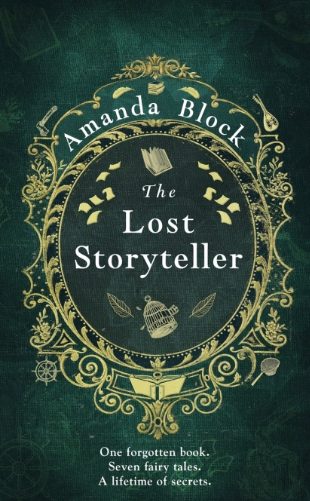Rebecca hasn’t seen her dad since she was six years old. She’s now almost twenty-six. She lives alone in a square, sensible, spartan flat and works as a dutiful office manager for a firm of surveyors. Unpacking after an office move she’s accosted by a journalist asking questions about her dad. One-time star of a well-loved storytelling television show for children, he subsequently disappeared, both from the show and from Rebecca’s life. The journalist is keen to track him down as part of a nostalgic feature. But even as Rebecca kicks the journalist and his provocative questions out, the encounter opens a door in her own head that isn’t easily closed.
The Lost Storyteller is Amanda Block’s first novel. In terms of page turnability (if that were a thing), she gives the likes of Dan Brown a run for his money. This is a well-constructed detective story driven by a daughter’s yearning to find out why her dad abandoned her and aided and abetted by a journalist’s instinct for questions and the eponymous search engine. But beyond that, it’s a story about stories and their power to seduce or soothe us.
Returning home for her grandmother’s birthday, Rebecca is furtively handed a leather-bound, gold-embossed book containing seven tales. Penned by her dad at some point after he left, and ostensibly only containing fantastical fairy stories, Rebecca gradually realises that the apparently nonsensical exploits of pixies, witches and dragons, contain more truth than she initially thinks.
Amidst all the telling of pixie stories and people’s stories, Block does some artful storytelling of her own with perceptively drawn characters. The novel is written from Rebecca’s perspective. We meet the other characters – the journalist, her persistent workmate, cosmopolitan best friend and moderately smothering mum – through her eyes so we share her irritations with their habits and behaviours. But as the story unfolds – and Rebecca’s safely contained world starts to admit other possibilities – so we start to learn more about the layers of secrets on which her careful comfort blanket of a life has been built.
Giving hopefully nothing away, the novel’s ending, complete with little pots of yoghurt, savoury muffins and the view from the “craggy crown” that is Arthur’s Seat, is beautifully, sensitively told. Block reminds us that people don’t always behave as we want them to, and maybe because of that, there are few things so powerful as the ability to be kind.
